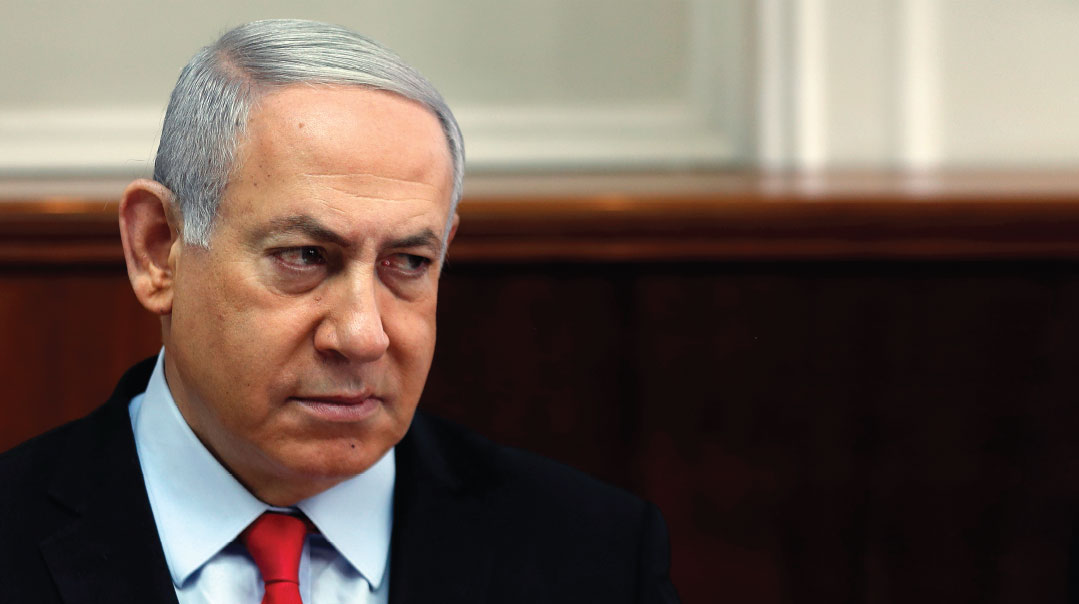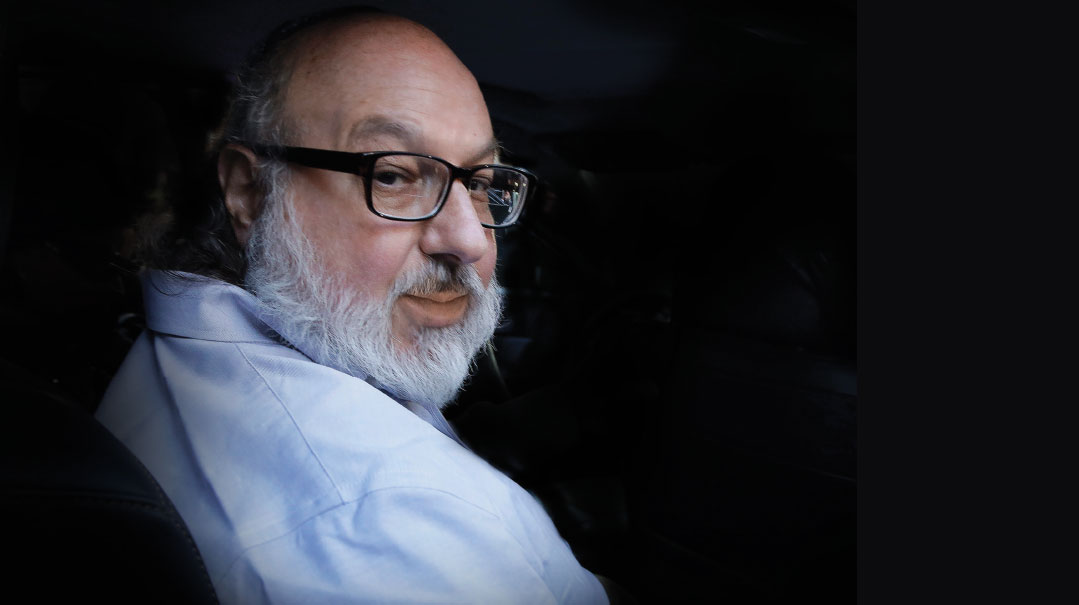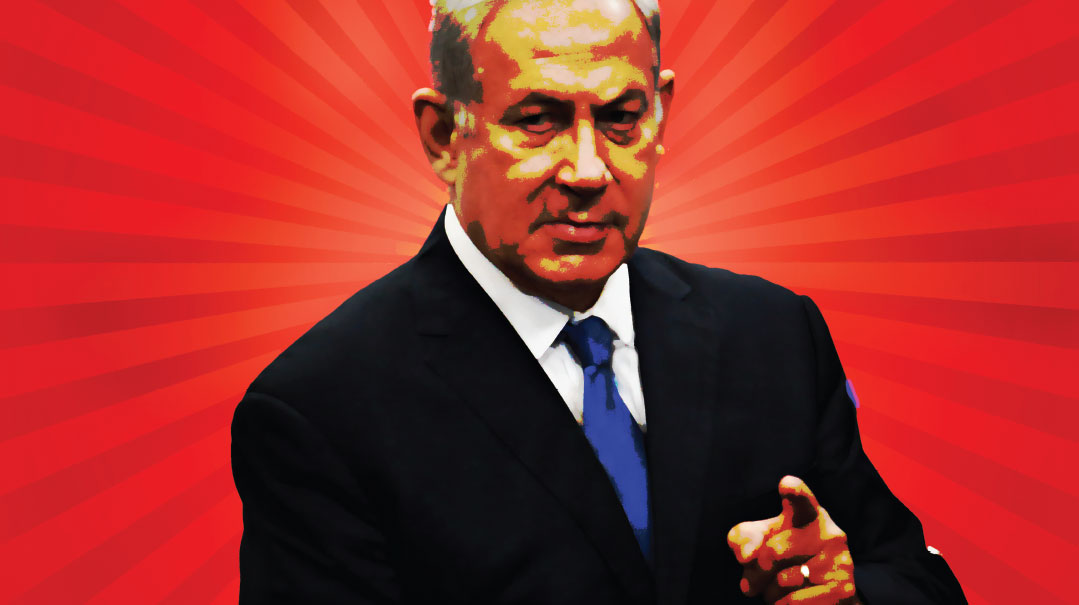Bibi’s Fight to the Finish

Can Israel's Mr. Indispensable make his case to a restless public?

Photos: AP images, Flash 90
When historians write the final chapter on Binyamin Netanyahu’s political career, will he join the short list of celebrated statesmen, in the mold of Winston Churchill?
Or will he be counted among the list of leaders such as former US president Richard Nixon, who despite their intellect, talents, and accomplishments, left the public stage wounded, their reputations permanently tarnished by scandal?
The wheels of history grind slowly. It will take years before the historical judgment can be fairly rendered on Netanyahu’s remarkable 30-year political career.
In answer to the burning question of the day: Is this finally the end of the Binyamin Netanyahu era? And what’s next for Israel’s fractious political terrain? One can only say at press time that there is a noose tightening around the prime minister’s political neck and nobody is helping to loosen it.
Under Israeli law, Netanyahu may continue to serve as prime minister despite the pending charges of bribery, fraud, and breach of trust. He will employ every legal method to retain power while his enemies and political opponents will exploit every legal means to oust him. Bibi retains the title of prime minister, but without a coalition to protect him and grant him immunity from prosecution, the legal establishment has more means at its disposal to oust him or make it impossible for him to rule. Ultimately, it might come down to a battle between the Knesset and the Supreme Court, in which the court will back the legal establishment and the Knesset will fail to act, faced once again with a barrage of self-righteousness from Israel’s quirky legal system and their partners, the mainstream media.
Ultimately, it is Netanyahu’s own Likud party that will determine his immediate political fate.
As of press time, which for us was Sunday this week, Gideon Saar had already thrown down the gauntlet, asking the Likud to hold a snap primary for new leadership, and recommending himself as new party leader. A few hours later, newly elected Likud member and former Jerusalem mayor Nir Barkat suggested holding primaries for a “deputy party leader” who would not immediately unseat Netanyahu but would be ready in case Bibi becomes politically indisposed.
Despite Netanyahu’s initial resistance, Likud party members were scheduled to debate these and perhaps other ideas Sunday night. They have little time to decide on the wisest course as the political clock is ticking.
Following the failure of both Netanyahu and his chief rival Benny Gantz to form a coalition, Israel has entered a no-man’s-land of 21-days ending on December 10, a period that will end either with the formation of a new government or with an announcement of new elections in March 2020, the third time voters will go to the polls in less than 365 days. During this 21-day period, any Knesset member who can garner the support of 61 MKs could potentially become the next prime minister.
Whether you like Bibi or not, he has been in power for ten consecutive years, providing Israel a stability that few, if any countries around the world can match. This 21-day period is fraught with uncertainty and is clearly the greatest challenge that Israel’s parliamentary democracy has ever faced.
Facing the Endgame
Bibi may be guilty of crimes. He may be guilty only of poor judgment. He might have been set up. He might be innocent. But the days of remaining innocent until proven guilty have been relegated to the scrap heap of history in an era of 24/7 scrolling headlines, where citizens make instantaneous judgments and then dig in their heels.
Most people have already made up their minds on Netanyahu’s innocence or guilt based on whether they love or hate Bibi.
In the very short-term, it will be the Likud itself that determines whether Bibi stays or goes. In Israel’s parliamentary democracy, Netanyahu is prime minister by virtue of the fact that he is number one on his party’s ticket.
The Likud has ruled Israel for some 30 out of the last 40 years, and only four men have headed the top of the ticket: Menachem Begin, Yitzhak Shamir, Ariel Sharon, and Binyamin Netanyahu. The party values stability. No matter how many Likud members publicly profess their loyalty to Netanyahu, privately none want to see the Likud consigned to the opposition.
Relegated to the opposition, their former coalition partners, the chareidim, national religious, and new right parties will have plenty of time to wring their hands, wondering how their once airtight center-right majority evaporated into thin air.
Where does that leave Bibi?
For now, as far as Bibi is concerned, he has to be scratching his head, saying: “What did I do to deserve this?”
In Bibi’s worldview, he accepted a few trinkets, fought under the table for better press coverage, and doled out a few political favors to his friends. Show me a politician who doesn’t do favors for his friends, and I’ll show you a politician whose term in office will be short.
Netanyahu didn’t take an envelope stuffed with cash like Ehud Olmert, nor did he direct his attorney general to cover up a criminal investigation to protect cronies and fire people investigating him like Nixon. In Bibi’s case, it was the very attorney general he appointed — the one who used to serve as his cabinet secretary and sit aside him at cabinet meetings — Avichai Mandelblit, who leveled the charges at Bibi. And Netanyahu made no attempt to tamper with the probe.
A Record of Accomplishment
At the same time, Bibi’s accomplishments make him a Churchill-like statesman.
Netanyahu not only holds the record for longevity in the office of prime minister of Israel, but the quality exceeds the quantity.
Perhaps his most recognizable talent is the command he displays on the public stage and his powers of persuasion. He can meet face to face with foreign leaders, sit before the cameras, and stand in front of international audiences and firmly and confidently explain Israel’s positions, with all the necessary historical context, in a fluent, unaccented English.
Netanyahu, who served as Israel’s UN ambassador and foreign minister before becoming prime minister for the first time in 1996, will be remembered as both a pragmatic and wily politician, always taking a cautious, middle-of-the-road approach. He stopped the territorial withdrawals under the Oslo process without entirely slamming shut the doors to the peace process, while cultivating relationships with other Arab and Muslim states. He withstood eight years of psychological pressure from President Obama, maintained constructive relations with other heads of state (even if they expressed frustration with Bibi), and presided over the growth of Israel’s military and economic growth. Last year, US News and World Report ranked Israel eighth on its list of world powers.
Following is a short list of Bibi’s main achievements along with his unfinished business. It will be up to the Likud party, the voters, and perhaps the courts — including the Supreme Court — to determine if the list ends here and historians can start scribbling, or if this list is premature.
Taking Care of Business
- Branding Iran Public Enemy #1
It is mainly thanks to Netanyahu that the international community is virtually unanimous in viewing Iran as a terrorist state and the major threat to world peace. While critics contend Bibi overplays the threat for political reasons, the prime minister takes at face value the threats of Iran’s leaders to wipe Israel off the map. Netanyahu’s lobbying of world leaders served as the impetus for the global sanctions regime that has taken a major toll on Iran’s economy. Netanyahu has also authorized numerous military strikes against Iranian military sites to stop Tehran from gaining a foothold in Syria. He will always be remembered for approving last year’s daring raid on a warehouse near Tehran that shed new light on Iran’s efforts to develop nuclear weapons. Bibi also had the chutzpah to address a joint session of Congress in March 2015 in a last-ditch effort to go over the heads of the Obama administration to stop the signing of the nuclear deal that granted sanctions relief to Iran. Bibi didn’t win that battle, but it didn’t take long for Obama’s successor, President Trump, to reverse course and get on the same page as Bibi.
- Rebranding the Economy
Netanyahu has been either prime minister, foreign minister, or finance minister for nearly 20 of the past 30 years. During that 30-year period, Israel’s economy has grown nearly tenfold, with gross domestic product rising from $37 billion to $365 billion. Israel also graduated from the ranks of an emerging market to membership in the Organization for Economic Co-operation and Development (OECD), which includes the world’s 36 most developed economies.
That’s the big picture, but Netanyahu’s direct role is often unsung. As finance minister from 2003-2005, he engineered a series of multi-year tax cuts that increased take-home pay by as much as 30% for middle class wage earners. (Bernie Sanders and Elizabeth Warren, take note.)
The next time someone tries to tell you that Israel is dependent on US aid, tell them that’s fake news, thanks to Bibi. In 1998, as prime minister, Netanyahu initiated and finalized a 10-year agreement with President Clinton and Congress to gradually wean Israel from direct US aid, which indeed ended on schedule. (Israel still receives $3.8 billion in military aid annually, but that’s essentially a subsidy for US defense contractors, because Israel is required to spend that aid in the United States).
- A Firebrand in Foreign Relations
For those old enough to remember Soviet military support for Arab nations and the threat that posed to Israel, the relationship Bibi developed with Russian President Vladimir Putin is a refreshing change. It is doubtful that Putin would have given a different Israeli leader the military leeway to operate against Iran and Hezbollah in Syria, with the confidence that the IDF will never deliberately harm Russian interests. Netanyahu has also cemented strong economic and trade relations with the world’s two most populous countries — China and India. Thanks to cover from the Trump administration, Netanyahu has warmed relations with Saudi Arabia and the Gulf States, drawing on their common fear of Iran and their interest in furthering economic relations with the US. Bibi can’t elaborate on the subject, but he often cites that Israeli intelligence services have furnished information to foreign countries that prevented some 50 terror attacks around the world in recent years.
Unfinished Business
- Borderline Insecurity
Netanyahu’s reputation as Mr. Security takes a few dings and dents with every new outbreak of hostilities on Israel’s border with Gaza. It remains a bit of a mystery how a ragtag band of terrorist groups can dictate the rules of the game to a powerful army like the IDF, but it’s been Netanyahu’s call not to take them on. He has good reasons. Netanyahu does not want to see Israel reenter and take control of Gaza’s hostile and poverty-stricken population. Reconquering Gaza would not be a repeat of the miraculous Six Day War: It could take six months or even six years to root out the terrorists, and Bibi is loath to embark on a military campaign with unknown consequences. There have also been reports that he does not have full confidence that the IDF can pull off a decisive victory. However, that’s little consolation for Jewish residents on the Gaza border who live in nightly fear of the next rocket attack and no solace at all for the parents of soldiers who died in battle in Gaza and whose bodies are held hostage by Hamas. Bibi’s failure to bring them back home for a Jewish burial is a blot on his record.
- Bridging the Religious-Secular Divide
While Netanyahu can be excused for spending the vast majority of his time on security and foreign policy issues, for all of his political savvy, he has misread Israel’s political map. As the two recent elections show, Israel’s electorate is still divided equally along the left and the right. But the issues that define left and right have changed. After the Oslo Accords and the Gaza disengagement turned disastrous for Israel, and the “Arab Spring” exposed the true face of our neighbors, Israelis have consigned the two-state solution to the dustbin of history. Today, the left-right divide focuses on social issues, mainly religion versus state. People get more riled up over whether a woman can sing in public than whether there will be a closure on the West Bank during the chagim. Instead of forcing compromises by political stiff-arming, Netanyahu punted on major bills, including the new IDF draft law, prayer rights at the Kosel, and other status quo issues including opening malls and transportation on Shabbos. Bibi faced a no-win situation, sandwiched between his religious coalition partners and the secular public. He has no answers to these burning questions and voters are seemingly looking for politicians that do, or at least say they do.
- Delaying the Deal of the Century
Speaking of statesmanship, President Trump has displayed some recently by holding back release of his deal of the century to avoid the appearance of interference in Israel’s election campaign. Bibi prevailed upon Trump’s good nature to keep the plan on ice for now, but this may prove to be a major strategic mistake. Trump has already moved the goalposts on Jerusalem, the Golan Heights, and lately, Judea and Samaria. While many are suspicious (including this writer at times) that these are the gifts that precede the demands, the odds are higher that the entire plan will tilt the entire playing field in Israel’s favor. Many critics feel that Netanyahu has not taken maximum advantage of Trump’s support to deal a lethal blow to our enemies and to cement Israel’s control in Judea and Samaria. Maybe this is part of a piecemeal process that’s already been agreed upon between Netanyahu and Trump and the best is yet to come. However, Trump’s reelection is not assured, Bibi’s career is on the brink, and there is a rising chance that this time, it is Israel, and not the Palestinians, who never miss an opportunity to miss an opportunity.
(Originally featured in Mishpacha, Issue 787)
Oops! We could not locate your form.













